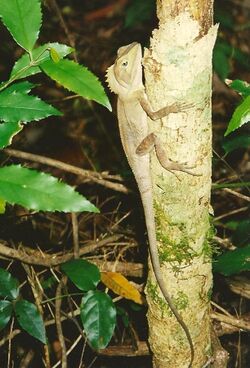Biology:Lophosaurus spinipes
| Lophosaurus spinipes | |
|---|---|

| |
| Southern angle-headed dragon - Boorganna Nature Reserve, near Taree, New South Wales, Australia | |
| Scientific classification | |
| Domain: | Eukaryota |
| Kingdom: | Animalia |
| Phylum: | Chordata |
| Class: | Reptilia |
| Order: | Squamata |
| Suborder: | Iguania |
| Family: | Agamidae |
| Genus: | Lophosaurus |
| Species: | L. spinipes
|
| Binomial name | |
| Lophosaurus spinipes (A.M.C. Duméril, 1851)
| |
The southern angle-headed dragon or southern forest dragon (Lophosaurus spinipes) is a species of agamid lizard endemic to Australia .[2]
Geographic range
L. spinipes is native to eastern Australian rainforests and rainforest margins from around Gosford in New South Wales to near Gympie in Queensland. It is also present in Barrington Tops National Park, New South Wales.
Description
The southern angle-headed dragon has a large and continuous nuchal crest with a moderately large vertebral crest. The angular brow is pronounced on both adults and juveniles. The snout to vent length is around 110 to 150 mm (4.3 to 5.9 in), additionally there is a long tail which takes the total length to 350 mm (14 in).
The colour varies from shades of brown, grey and green. Patterns where present consist of various irregular mottling, blotches and variegations.
Behaviour
Primarily arboreal, the southern angle-headed dragon is cryptic, slow moving and well camouflaged. It's sometimes encountered basking in sunlight after rain but is mostly a thermoconformer, allowing its body temperature to fluctuate with the ambient temperature. It is usually seen perching on the trunks of small trees or on buttress roots or old stumps. When disturbed, it tends not to dash for cover, but rather slides around the trunk until it is out of view.
Diet
The diet includes insects and other arthropods such as spiders and centipedes.[3]
Reproduction
Eggs are laid in shallow nests in rainforest clearings, including along road edges and walking tracks. There is some evidence that females will occasionally lay communal nests. The eggs are vulnerable to predation, particularly by goannas.
A small southern angle-headed dragon on a cabbage tree palm, near Forster, Australia
References
- ↑ Melville, J. (2018). "Lophosaurus spinipes". IUCN Red List of Threatened Species 2018: e.T22566077A22566092. doi:10.2305/IUCN.UK.2018-1.RLTS.T22566077A22566092.en. https://www.iucnredlist.org/species/22566077/22566092. Retrieved 19 November 2021.
- ↑ Denzer, Wolfgang; Manthey, Ulrich (2016). "Remarks on the taxonomy and nomenclature of the genus Hypsilurus Peters, 1867 (Reptilia, Agamidae, Amphibolurinae)" (in en). Zoosystematics and Evolution 92 (1): 103–110. doi:10.3897/zse.92.7469. ISSN 1860-0743. https://zse.pensoft.net/articles.php?id=7469.
- ↑ Manning, A (1992). "Diet of the Southern Angle-headed Dragon Hypsilurus spinipes". Herpetofauna 22: 18–20.
Further reading
- A Complete Guide to Reptiles of Australia - Steve Wilson & Gerry Swan ISBN:1-876334-72-X
- https://web.archive.org/web/20090415081346/http://www.australianreptilepark.com.au/
- Lophosaurus spinipes at the Reptarium.cz Reptile Database
- Torr, Geordie (2003). "Here be dragons". Australian Geographic. 69: 68–77.
- Rummery, C.; Shine, R.; Houston, D.L.; & Thompson, M.B. (1995). Thermal biology of the Australian forest dragon, Hypsilurus spinipes (Agamidae). Copeia, 1995(4):818-827.
Wikidata ☰ Q3019604 entry
 |



